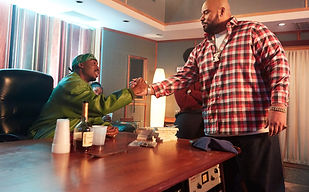

SUMMIT ENTERTAINMENT (2017)
Director: Benny Boom
Starring: Demetrius Shipp Jr., Kat Graham, Lauren Cohan, Hill Harper, Danai Gurira, Dominic L. Santana, Annie Ilonzeh
“I don’t have no fear of death. My only fear is coming back reincarnated.”
One of many memorable quotes by the subject of All Eyez on Me - Tupac Shakur, the legendary hip-hop artist, poet, actor and activist. A man who has sold over 75 million records, inspired countless young artists and left behind a larger-than-life legacy. A revolutionary and a man well-versed in the words of Shakespeare.
A man whose life has been crying out for an in-depth, heavy and emotional biographical retelling. The job was entrusted to rookie Benny Boom and unfortunately he wasn’t up to the task.
The movie follows Tupac from his earliest times as a child, growing up around the Black Panthers movement through to his untimely murder in Las Vegas and touches on the highlights of his life in-between. I say touching because frustratingly the movie never looks to go too deep into these life events, merely ticking them off the list.
Paced erratically and with a confusing narrative, Boom already sets the viewer up for something unnecessary – deciphering the movie rather than absorbing it. All Eyez on Me cuts between an interview in jail between Tupac (Shipp Jr.) and an unnamed interviewer (Harper) where key moments of Tupac’s life are bought up and then revealed in flashbacks. The problem here is that the flashbacks seem to flit between events quickly, including the use of fade to black and unknown amounts of time passing.
Demetrius Shipp Jr. does a fine job as Tupac and certainly pulls off the look of the man – what he lacks in swagger he makes for in image. The writers didn’t do enough to show us the introspective side of Tupac, focusing more on his harder side, the Thug Life element. So much was left out that would’ve presented an accurate portrayal of the icon – the times of his life living in the shelters, the childhood tragedies in Baltimore, the infamous Detroit Red Wings journalist spat, his greater community work, his most-acclaimed film performance in Poetic Justice and the paranoia and prophecies of his final months that are so evident in songs such as “So Many Tears” and “Only Fear of Death”. Tupac’s legacy was immortalised further due to him prophesising his own death in the months leading up to it and that it is not mentioned during the film is startlingly unforgivable. What we do get is Boom setting up Tupac as wholly innocent in the case of his sexual abuse charge.
The third act of the movie is by far the strongest area (which is actually refreshing for a movie) as Death Row Records owner and mogul Suge Knight (Santana) gives Tupac a way out of jail and a place within the Death Row family. The family (including Dr. Dre and Snopp Dogg, played by Harold House Moore and Jarrett Ellis respectively) are shown collaborating on new music, eating together and the tight knit group is established, as is Knight’s aggressiveness towards anyone not towing his line – there’s a nice shot of Knight and Dre passing through a corridor, each eyeing the other with a look that plainly suggests the end of their business relationship together. Tupac’s relationship with Kidada Jones (Ilonzeh) is also quickly established before the end, though their engagement is only fleetingly mentioned.
The tragic shooting of Tupac is handled well and with a respectful tone. Nothing gratuitous is shown and the re-enactment is as faithful as it can be – from the photograph snapped of him moments before, the ladies pulling up beside him looking for an invite to the party to the notorious white Cadillac silently sidling up to Knight’s BMW where the assailants fired the fatal shots. There’s a poignancy about the scenes as muted sounds play over the slow chaos with Tupac stricken on the sidewalk before the quick hospital scenes and a fade to black. It was always going to be the movies emotional beat and its one critical scene the writers got right.
Another positive was the relationship between Tupac and his mother Afeni (Gurira). She had been the subject of many of his songs and to see the complex relationship played out was handled-well (for the most part) and provided the crux for the movie to play against.
Legends never die. The legacy also doesn’t but there’s sadly nothing here to further it.










August 2nd 2017